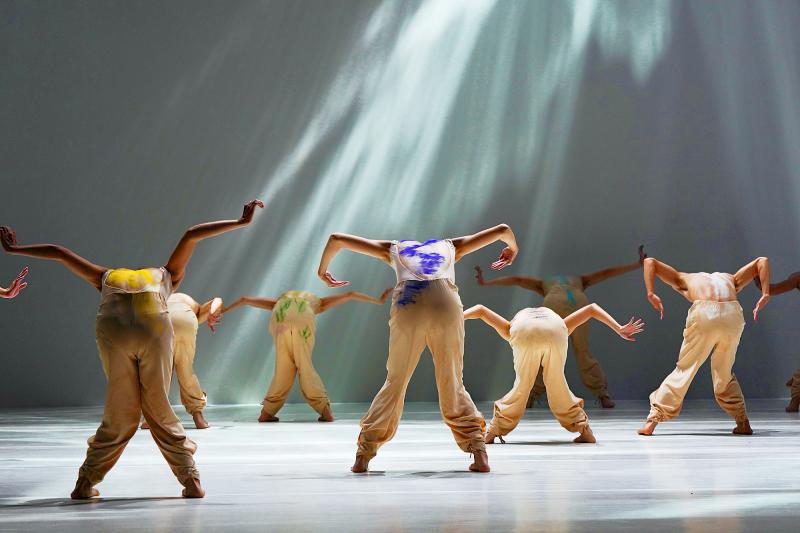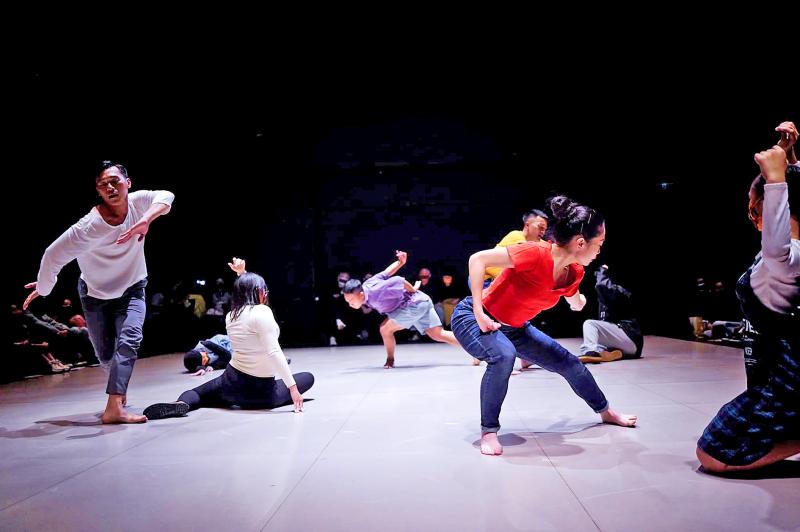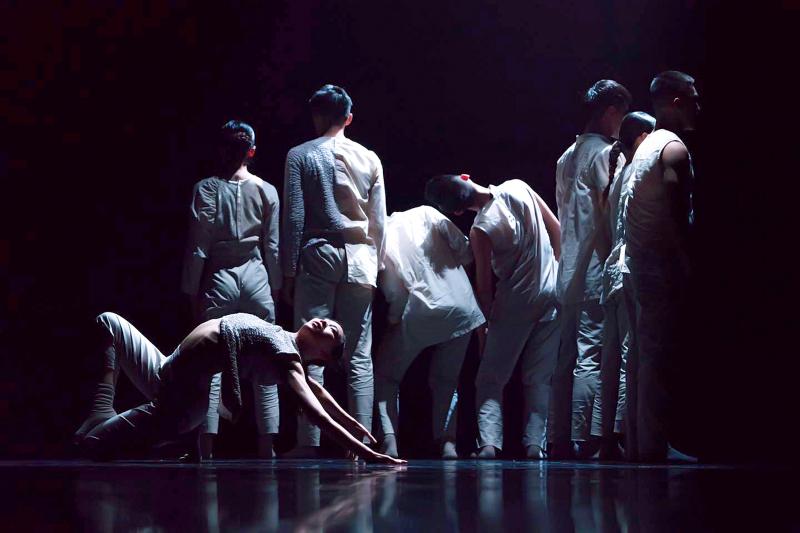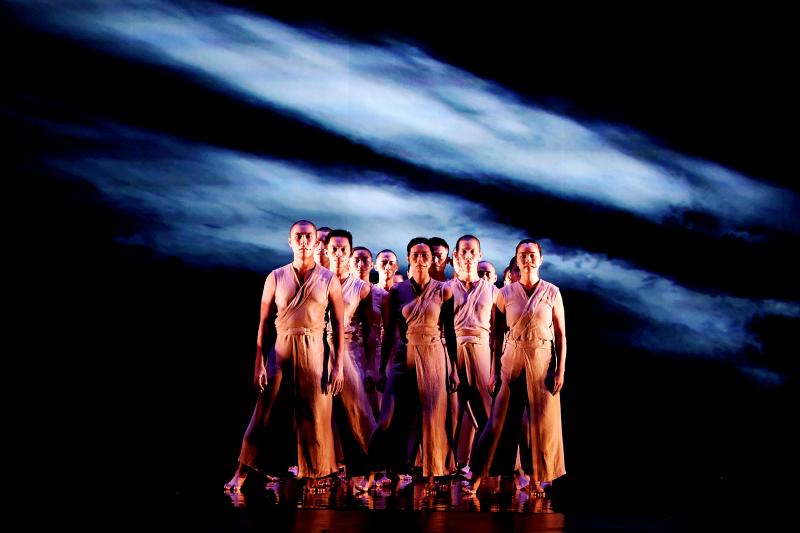In a year when so many theaters and performing arts companies were forced to shutter due to the COVID-19 pandemic, audiences and artists in Taiwan were able to enjoy a relative degree of normality, and I felt ridiculously fortunate to not only be able to see shows, but see so many good ones.
While many productions exceeded expectations, I decided against doing a Top 10 dance list, choosing instead to focus on the development of choreographers and companies shown through their new works or revivals.
However, if there were a list, Cheng Tsung-lun’s (鄭宗龍) Sounding Light (定光), his first full-length work for Cloud Gate Dance Theatre (雲門舞集) as artistic director, would be on top.

Photo: CNA
Sounding Light, which premiered at the National Theater in Taipei on Oct. 1, is deceptively sparse, yet filled with intriguing movement, light patterns and sounds that highlight Cheng’s continuing development of a unique movement vocabulary and stage artistry.
It is also a testament to the depth of talent Cheng has to work with in a reformatted company made up of veterans of Cloud Gate and the now-suspended Cloud Gate 2 (雲門2).
Depth of talent is the hallmark of another company that grew out of Cloud Gate: the Bulareyaung Dance Company (BDC, 布拉瑞揚舞團), whose founder, Bulareyaung Pagarlava (Bula) started his career as a Cloud Gate dancer and became CG2’s first resident choreographer.

Photo courtesy of Tjimur Dance Theatre
He returned to Taitung County in 2014 to establish his own troupe and focus on the development of dancers from indigenous communities, and BDC marked its fifth anniversary this year with LIMA, a weekend sampler of works at the Cloud Gate Theater in New Taipei City.
The sold-out run turned out to be a massive love fest between the company’s multi-talented men, who dance, sing and act with such exuberance, yet still wring tears in the more poignant moments, and their fans.
I caught the first show, Yes or NO (#是否), which was just as good as last year’s premiere, but left me wishing I could have dropped everything else to see the rest of the weekend’s performances.

Photo courtesy of Hung Dance
Two shows by BDC’s older counterpart from Pingtung County, the family-run Tjimur Dance Theatre (蒂摩爾古薪舞集) also stole my heart: a restaging last month of Varhung — Heart to Heart (Varhung — 心事誰人知) at the National Kaohsiung Center for the Arts’ Dance Platform, and their new production, Go Paiwan (去排灣), at the National Experimental Theater in Taipei at the beginning of this month.
For Go Paiwan, artistic director Ljuzem Madiljin for the first time invited a guest choreographer to work with her choreographer brother, Baru Madiljin, to develop a “dance theater” piece.
Lin Wen-chung’s (林文中) contribution help create a show that celebrates the company’s traditional dance and singing strengths while embracing audience participation and smartphone technology. It proved to be terrific fun.

Photo: AFP
Lai Hung-chung (賴翃中) also moved beyond his comfort zone with his latest work for his Hung Dance (翃舞製作) troupe, See You (再 見), which premiered at the Taipei Shuiyuan Theater on Nov. 6.
Set on eight dancers, it is a moving exploration of life and loss, and demonstrates Lai’s ability craft more than the duets and trios that he is known for.
Two revivals that were actually almost complete restagings, while vastly different in size and scope, were knock-outs: U-Theatre’s (優人神鼓) River Journey (與你共舞) at the National Theater last weekend and Taipei Dance Forum’s (舞蹈空間) Red and White, zoom-in (紅與白zoom-in版) by choreographer Cheng Yi-wen (鄭伊雯) and theater director Liu Shou-yao (劉守曜) in September.
Two memorable shows from the Taipei Arts Festival were Berlin-based Singaporean artist Choy Ka-fai’s (徐家輝) CosmicWander: OnGon+NeZha and from Thailand, Pichet Klunchun Dance Company’s No. 60.
And while not a dance production, I cannot end this round-up without mentioning Formosa Circus Art’s (FOCA, 福爾摩沙馬戲團) Moss (苔痕), a collaboration with Germany-based dancer/choreographers Jan Mollmer and Tien Tsai-wei (田采薇).
A combination of circus acrobatics and dance theater, it is an outstanding show about friendship and memories, and a proof of FOCA’s commitment to challenge boundaries and preconceptions.

Dissident artist Ai Weiwei’s (艾未未) famous return to the People’s Republic of China (PRC) has been overshadowed by the astonishing news of the latest arrests of senior military figures for “corruption,” but it is an interesting piece of news in its own right, though more for what Ai does not understand than for what he does. Ai simply lacks the reflective understanding that the loneliness and isolation he imagines are “European” are simply the joys of life as an expat. That goes both ways: “I love Taiwan!” say many still wet-behind-the-ears expats here, not realizing what they love is being an

Every now and then, even hardcore hikers like to sleep in, leave the heavy gear at home and just enjoy a relaxed half-day stroll in the mountains: no cold, no steep uphills, no pressure to walk a certain distance in a day. In the winter, the mild climate and lower elevations of the forests in Taiwan’s far south offer a number of easy escapes like this. A prime example is the river above Mudan Reservoir (牡丹水庫): with shallow water, gentle current, abundant wildlife and a complete lack of tourists, this walk is accessible to nearly everyone but still feels quite remote.

It’s a bold filmmaking choice to have a countdown clock on the screen for most of your movie. In the best-case scenario for a movie like Mercy, in which a Los Angeles detective has to prove his innocence to an artificial intelligence judge within said time limit, it heightens the tension. Who hasn’t gotten sweaty palms in, say, a Mission: Impossible movie when the bomb is ticking down and Tom Cruise still hasn’t cleared the building? Why not just extend it for the duration? Perhaps in a better movie it might have worked. Sadly in Mercy, it’s an ever-present reminder of just

Google unveiled an artificial intelligence tool Wednesday that its scientists said would help unravel the mysteries of the human genome — and could one day lead to new treatments for diseases. The deep learning model AlphaGenome was hailed by outside researchers as a “breakthrough” that would let scientists study and even simulate the roots of difficult-to-treat genetic diseases. While the first complete map of the human genome in 2003 “gave us the book of life, reading it remained a challenge,” Pushmeet Kohli, vice president of research at Google DeepMind, told journalists. “We have the text,” he said, which is a sequence of